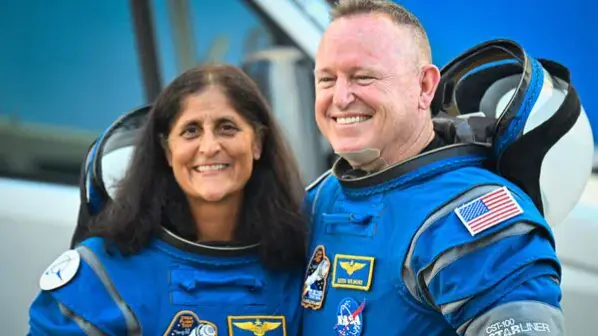Updated 17 March 2025 at 09:41 IST
How Much NASA is Paying Space Stranded Astronauts Sunita Williams and Barry Wilmore?
Sunita Williams is classified under the GS-15 pay grade, which is the highest level for federal employees in the General Schedule (GS) system.
- Science News
- 2 min read

NASA astronauts Sunita Williams and Butch Wilmore, who have been stuck on the International Space Station (ISS) since June 2024 due to technical issues, are set to return to Earth aboard SpaceX’s Dragon spacecraft, likely by March 19, 2025.
Astronaut Pay During Extended Stay
According to retired NASA astronaut Cady Coleman, astronauts do not receive special overtime pay for spending extra time in space. As federal employees, they continue to earn their regular salary, just like any other government job. NASA also covers their food and living expenses while they're on the ISS.
The only extra pay astronauts receive is a small daily stipend for incidentals, reportedly around $4 (Rs 347) per day. For example, Cady Coleman received about $636 (around Rs 55,000) for a 159-day mission. By that calculation, Williams and Wilmore, who have spent over 287 days in space, would each receive about $1,148 (around Rs 1 lakh) in additional compensation.
How Much Nasa is paying to Sunita Williams and Butch Wilmore?
Sunita Williams and Butch Wilmore are classified under the GS-15 pay grade, the highest level for federal employees. This pay grade comes with an annual salary between $125,133 - $162,672 (around Rs 1.08 crore - Rs 1.41 crore).
Advertisement
For their extended 9-month stay on the ISS, they will earn a prorated salary between $93,850 - $122,004 (Rs 81 lakh - Rs 1.05 crore). Adding the incidental pay, their total earnings for the mission will be between $94,998 - $123,152 (around Rs 82 lakh - Rs 1.06 crore).
Sunita Williams' Homecoming Soon
Sunita Williams and Butch Wilmore were originally scheduled to return sooner, but delays in their spacecraft, the Boeing Starliner, caused setbacks. NASA has now approved a relief mission, and the SpaceX Crew-10 mission has successfully arrived at the ISS. This mission brought four new astronauts: NASA's Anne McClain and Nichole Ayers, Japan's Takuya Onishi, and Russia's Kirill Peskov.
Advertisement
Published By : Navya Dubey
Published On: 17 March 2025 at 09:41 IST
